Bass CDs
New Album: Ciara Moser, Blind. So what?
Ciara Moser, Blind. So what?…
Irish/Austrian Bass Prodigy Ciara Moser Explores on Her Journey as a Blind Musician on Her Modern Jazz Fusion Debut, Blind. So what?
As a professional bassist and someone who has been blind since birth, part of Dublin-born/Austria-raised/Boston-based Ciara Moser’s identity has shaped her unique journey through life and music in a profound way. Blind. So what?, Moser’s modern jazz fusion debut album, is centered around her experience as a blind musician while also raising awareness for the blind community.
The songs on Blind. So what?, available October 20, explore topics such as the art of memorizing, spatial sense for orientation, trusting others, and the different perceptions that blind people have on the world. The 27-year-old Moser, who plays virtuosic basslines on a Fodera electric six-string throughout the album, undoubtedly knows her way around groove-laden funk fusion and experimental contemporary jazz/world music.
While Moser pursued her master’s degree at the Berklee Global Jazz Institute, she was mentored by its director and multiple GRAMMY-winning Panamanian pianist Danilo Perez, who Moser has performed with around the globe, John Patitucci, Victor Wooten, Terri Lyne Carrington, Joe Lovano and others. Moser’s stint at Berklee not only heightened her playing and composing skills but she was also deeply inspired by the theme of using music as a vehicle for social change, thus inspiring her to pen compositions for Blind. So what? Each tune on the album is lyrically and instrumentally dedicated to one topic concerning music and blindness. The lyrics were written by Moser except for the poem “The Lady with a Green Cane.”
Moser’s insightful arrangements on Blind. So what? give each of the many of the album’s musicians, most of which all current and former Berklee students, a chance to showcase their artistry and add their individual flavor to the compositions. Moser is joined by drummer and vocalist Lumanyano MZI, percussionists Juan Sebastian Sanchez and George Lernis, keyboardists Warren Pettey, Stephanie Weninger and Anastassiya Petrova, guitarists Amaury Cabral, Liam Garcia and Isaac Romagosa, saxophonists Salim Charvet, Shahar Amdor and Lihi Haruvi, lead vocalists Aditi Malhotra andNishant Shekar, backing vocalists Masa Vujadinovic and Shivaraj Natraj as well as several others who provide spoken voices.
Following an intro that a screen reader (software that translates what is displayed on the screen for a blind person) recites the album title in 16 languages, Moser, and the band lock into the tight funk groove on “I Trust.” Moser says the composition is dedicated to the “trust in sighted peers, friends, family and colleagues which is necessary for living in this visual world as a blind person. The first step to trust others is to be confident in yourself, let go of any fear and urge to control and open your heart and have faith in the people who help me to see.”
Moser says “Memory,” for which she won a 2023 Herb Alpert Young Jazz Composers Award, “is about the art and structure of memorizing, which is crucial for a blind person. A blind person needs to memorize all the music they play, the ways they walk, where they put their belongings and many more things. The task of internalizing melody and chords of a song like a language or a code requires practice, discipline, patience, consistency, concentration, and energy and in contrast to reading it will help the player to express the emotion and message of the song.”
“The Call to See Beyond,” Moser says, is about “the visual first impression a person has of someone and a call to see beyond the physical appearance of a person. Open your heart, soul and see beyond because the person is the thing we care about and not the stereotypes that were put on them and what they look like by society. A blind person is not blinded by those things.”
“Different Ability” is a two-part composition in which the first part is “dedicated to the moment of realization that something is different, and we are being treated differently while entering school, kindergarten and growing up as a blind person,” Moser says. Part two of “Different Ability” outlines the importance of individuality and leads to the conclusion that being different is something special.
Moser plays a stunning two-minute bass intro before launching into the Latin-tinged “Humanity,” which she says speaks of the dark sides of humanity, “but that the belief in hope and its ability to strive will lead towards inclusion, unity and equality.” The composition features vocalists from India and South Africa who say and sing the words hope, unity and humanity in their mother tongues.
Moser’s composition “Developing Senses” looks at the higher use of senses that blind people need to compensate for lack of sight. “A sighted person relies on 90 percent of their perceptional information for seeing, which means that there is only 10 percent left for other methods of perception,” Moser says. “A blind person, however, makes far more use of the other senses, such as hearing and touch, and thus elevating these senses far beyond those of sighted individuals. In the piece each of the four senses a blind person uses to a higher extent is assigned a motive and the motives are extended and developed throughout the piece, which symbolizes the higher use of those senses.”
“Sixth Sense” is about the proprioception sense or kinesthesia, the sense of body awareness. The song contains spacy sounds and rhythms that symbolize the feeling of movement.
On the odd-metered song “Traveling,” Moser invites the listener into the world of traveling as a blind person with different smells, feelings, emotions, tastes and influences weaved into the composition to create a full sensory experience. “Along with the exciting 11/8 rhythms come catchy synth and guitar sounds and a Moroccan drone with an emotional and meditational improvisation bring the idea of traveling through music to a new level,” Moser says.
The album closes with “The Lady with a Green Cane,” a free improvisation performed along with a poem of the same name written by Fran Gardner. Moser says the poem was recorded first, and then everyone improvised over it one at a time. Each musician had only one take to improvise, which allowed for an honest and raw interpretation from every instrument.
Visit online at ciara-moser.com
Bass CDs
New Album: Jake Leckie, Planter of Seeds
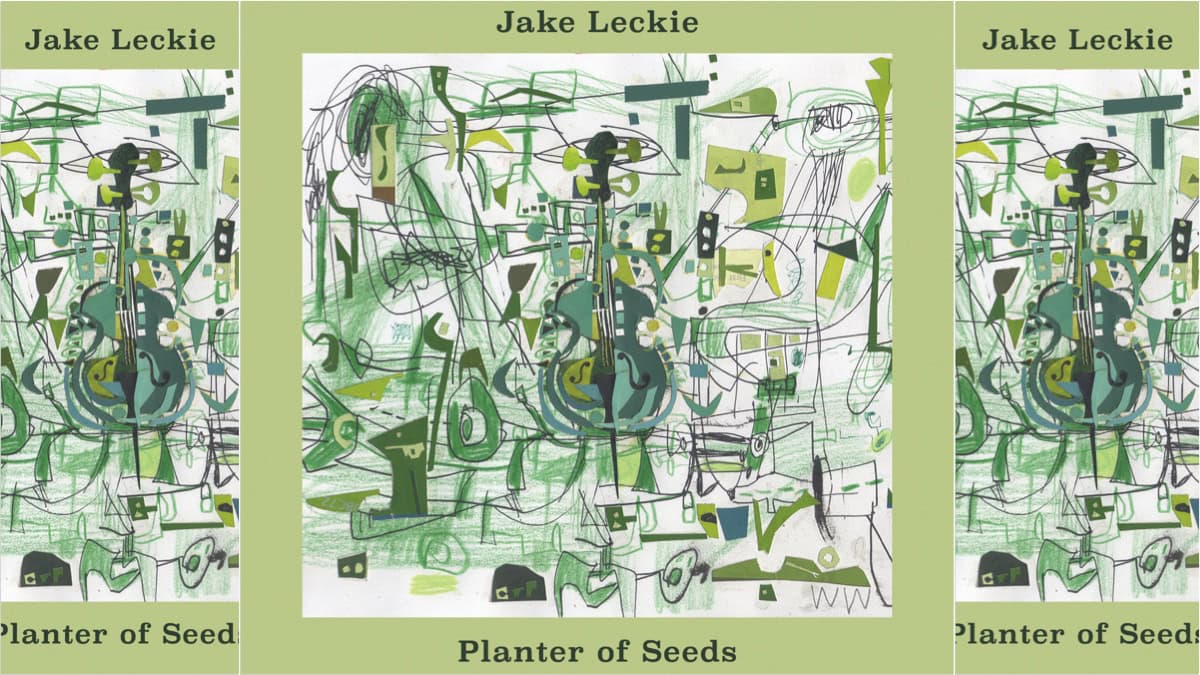
Bassist Jake Leckie and The Guide Trio Unveil New Album Planter of Seeds,
to be released on June 7, 2024
Planter of Seeds is bassist/composer Jake Leckie’s third release as a bandleader and explores what beauty can come tomorrow from the seeds we plant today.
What are we putting in the ground? What are we building? What is the village we want to bring our children up in? At the core of the ensemble is The Guide Trio, his working band with guitarist Nadav Peled and drummer Beth Goodfellow, who played on Leckie’s second album, The Guide, a rootsy funky acoustic analog folk-jazz recording released on Ropeadope records in 2022. For Planter of Seeds, the ensemble is augmented by Cathlene Pineda (piano), Randal Fisher (tenor saxophone), and Darius Christian (trombone), who infuse freedom and soul into the already tightly established ensemble.
Eight original compositions were pristinely recorded live off the floor of Studio 3 at East West Studios in Hollywood CA, and mastered by A.T. Michael MacDonald. The cover art is by internationally acclaimed visual artist Wayne White. Whereas his previous work has been compared to Charles Mingus, and Keith Jarrett’s American Quartet with Charlie Haden, Leckie’s new collection sits comfortably between the funky odd time signatures of the Dave Holland Quintet and the modern folk-jazz of the Brian Blade Fellowship Band with a respectful nod towards the late 1950s classic recordings of Ahmad Jamal and Miles Davis.
The title track, “Planter of Seeds,” is dedicated to a close family friend, who was originally from Trinidad, and whenever she visited family or friends at their homes, without anyone knowing, she would plant seeds she kept in her pocket in their gardens, so the next season beautiful flowers would pop up. It was a small altruistic anonymous act of kindness that brought just a little more beauty into the world. The rhythm is a tribute to Ahmad Jamal, who we also lost around the same time, and whose theme song Poinciana is about a tree from the Caribbean.
“Big Sur Jade” was written on a trip Leckie took with his wife to Big Sur, CA, and is a celebration of his family and community. This swinging 5/4 blues opens with an unaccompanied bass solo, and gives an opportunity for each of the musicians to share their improvisational voices. “Clear Skies” is a cathartic up-tempo release of collective creative energies in fiery improvisational freedom. “The Aquatic Uncle” features Randal Fisher’s saxophone and is named after an Italo Calvino short story which contemplates if one can embrace the new ways while being in tune with tradition. In ancient times, before a rudder, the Starboard side of the ship was where it was steered from with a steering oar. In this meditative quartet performance, the bass is like the steering oar of the ensemble: it can control the direction of the music, and when things begin to unravel or become unhinged, a simple pedal note keeps everything grounded.
The two trio tunes on the album are proof that the establishment of his consistent working band The Guide Trio has been a fruitful collaboration. “Santa Teresa”, a bouncy samba-blues in ? time, embodies the winding streets and stairways of the bohemian neighborhood in Rio de Janeiro it is named for. The swampy drum feel on “String Song” pays homage to Levon Helm of The Band, a group where you can’t always tell who wrote the song or who the bandleader is, proving that the sum is greater than the individual parts. Early jazz reflected egalitarianism in collective improvisation, and this group dynamic is an expression of that kind of inclusivity and democracy.
“The Daughters of the Moon” rounds out the album, putting book ends on the naturalist themes. This composition is named after magical surrealist Italo Calvino’s short story about consumerism, in which a mythical modern society that values only buying shiny new things throws away the moon like it is a piece of garbage and the daughters of the moon save it and resurrect it. It’s an eco-feminist take on how women are going to save the world. Pineda’s piano outro is a hauntingly beautiful lunar voyage, blinding us with love. Leckie dedicates this song to his daughter: “My hope is that my daughter becomes a daughter of the moon, helping to make the world a more beautiful and verdant place to live.”
Bass CDs
Debut Album: Nate Sabat, Bass Fiddler
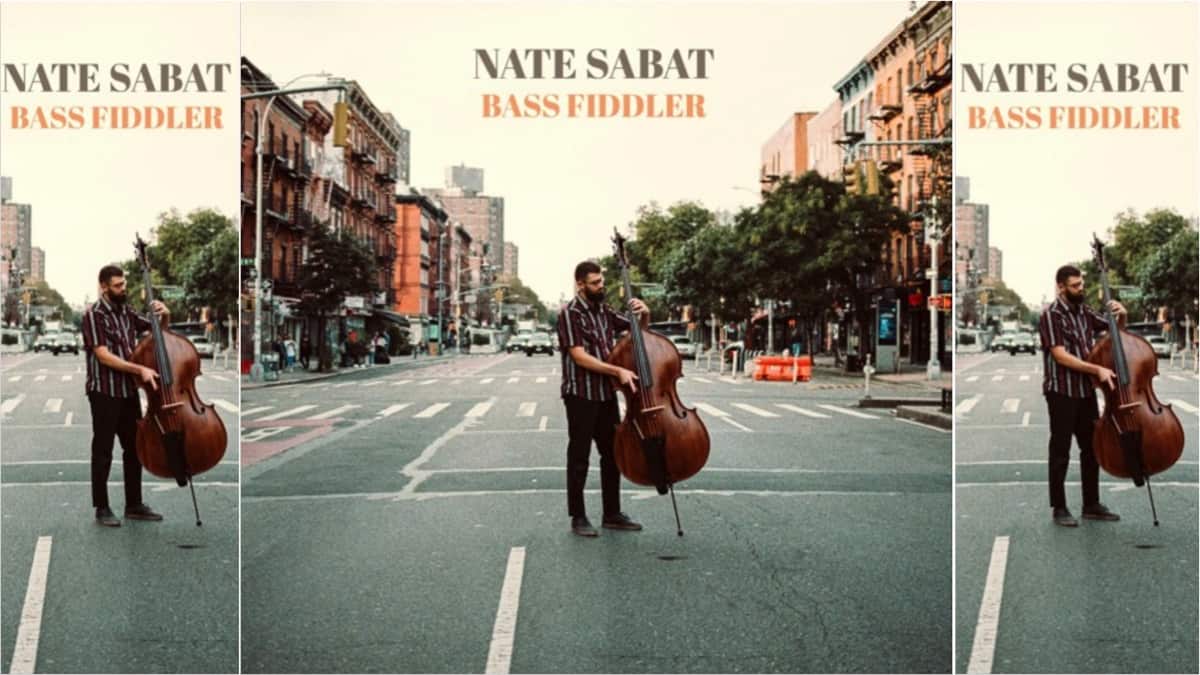
In a thrilling solo debut, bassist Nate Sabat combines instrumental virtuosity with a songwriter’s heart on Bass Fiddler…
The upright bass and the human voice. Two essential musical instruments, one with roots in 15th century Europe, the other as old as humanity itself.
On Bass Fiddler (Adhyâropa Records ÂR00057), the debut album from Brooklyn-based singer-songwriter and bass virtuoso Nate Sabat, the scope is narrowed down a bit. Drawing from the rich and thriving tradition of American folk music, Sabat delivers expertly crafted original songs and choice covers with the upright bass as his lone tool for accompaniment.
The concept was born a decade ago when Sabat began studying with the legendary old-time fiddler Bruce Molsky at Berklee College of Music. “One of Bruce’s specialties is singing and playing fiddle at the same time. The second I heard it I was hooked,” recalls Sabat. “I thought, how can I do this on the bass?” From there, he was off to the races, arranging original and traditional material with Molsky as his guide. “Fast forward to 2020, and I — like so many other musicians — was thinking of how to best spend my time. I sat down with the goal of writing some new songs and arranging some new covers, and an entire record came out.” When the time came to make the album, it was evident that Molsky would be the ideal producer. Sabat asked him if he’d be interested, and luckily he was. “What an inspiration to work with an artist like Nate,” says Molsky. “Right at the beginning, he came to this project with a strong, personal and unique vision. Plus he had the guts to try for a complete and compelling cycle of music with nothing but a bass and a voice. You’ll hear right away that it’s engaging, sometimes serious, sometimes fun, and beautifully thought out from top to bottom.”
While this record is, at its core, a folk music album, Sabat uses the term broadly. Some tracks lean more rock (‘In the Shade’), some more pop (‘White Marble’, ‘Rabid Thoughts’), some more jazz (‘Fade Away’), but the setting ties them all together. “There’s something inherently folksy about a musician singing songs with their instrument, no matter the influences behind the compositions themselves,” Sabat notes. To be sure, there are plenty of folk songs (‘Louise’ ‘Sometimes’, ‘Eli’) and fiddling (‘Year of the Ox’) to be had here — the folk music fan won’t go hungry. There’s a healthy dose of bluegrass too (‘Orphan Annie’, ‘Lonesome Night’), clean and simple, the way Mr. Bill Monroe intended.
All in all, this album shines a light on an instrument that often goes overlooked in the folk music world, enveloping the listener in its myriad sounds, textures, and colors. “There’s nothing I love more than playing the upright bass,” exclaims Sabat. “My hope is that listeners take the time to sit with this album front to back — I want them to take in the full scope of the work. I have a feeling they’ll hear something they haven’t heard before.”
Available online at natesabat.bandcamp.com/album/walking-away
Bass CDs
New Album: Avery Sharpe, I Am My Neighbors Keeper
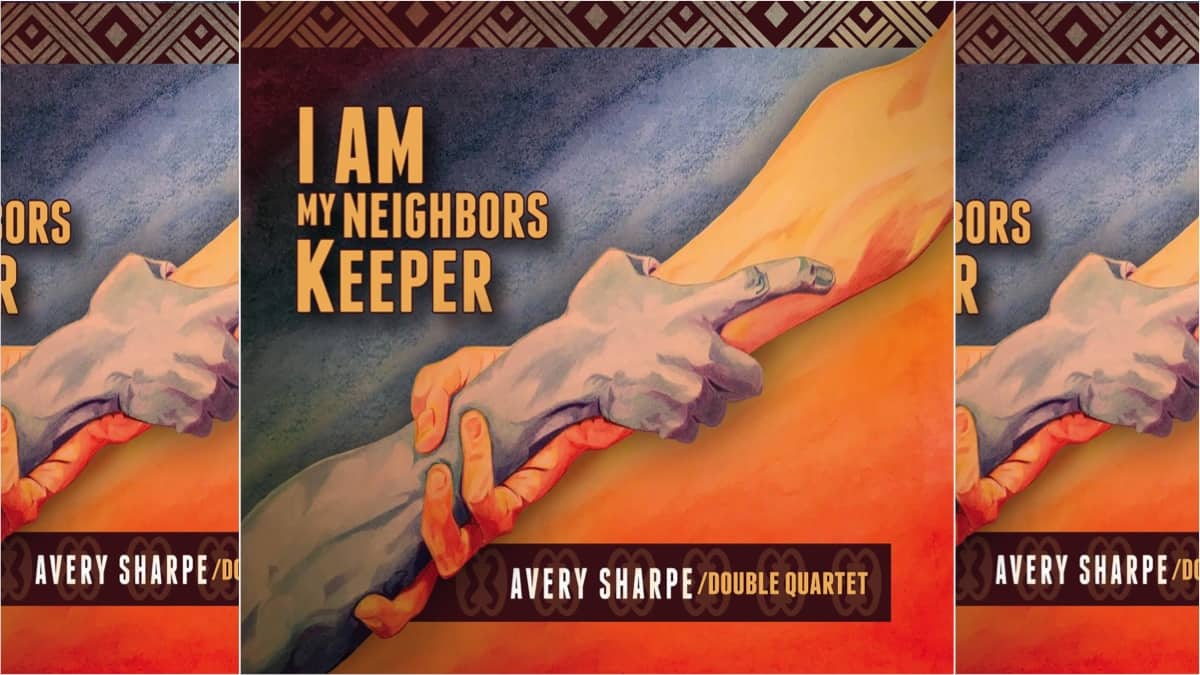
Avery Sharpe and his Double Quartet to release, I Am My Neighbors Keeper
A new recording will be released on JKNM Records by internationally renowned bassist/composer Avery Sharpe, “I Am My Neighbors Keeper” is scheduled for release in June 2024.
Sharpe has composed a new work that highlights our commitment to one another. Avery initiated the project as a response to the political and racial division that has grown over the past seven years in the country. “The U.S political climate has drastically changed in the past 40-plus years, especially during the last seven of those years. In this age of greed, which Sharpe refers to as “IGM,” I Got Mine, basic human compassion has been eroded. Racial, economic and social strides are being turned back.
“We have food insecurity, the unhoused, pandemics, school shootings, domestic violence, and an opioid problem, just to name some. There is a need to remind people that each of us is here on this planet for a very short period of time. It doesn’t matter if one has a religious approach or a secular approach, it all comes down to concern and compassion for each other. Through these compositions and recordings, Avery’s mission as an artist is to remind us that we all are interconnected and that ‘We Are Our Neighbor’s Keeper.’ When we help to uplift one, we uplift everyone,” Sharpe said.
Each movement in the piece describes the values we should strive for to help one another for this multi-media (video slide show during performance) and multi-discipline performance.
Many of Sharpe’s projects and recordings have been about “standing on the shoulders of ancestors, heroes and sheroes.” Among his recordings and projects, include “Running Man” (celebrating the athlete Jesse Owens), “Ain’t I A Woman” (about Sojourner Truth), and his most recent project “400: An African American Musical Portrait” (marking the 400 years from 1619 to 2019).
Avery Sharpe has recorded and performed with many jazz greats from Dizzy Gillespie to Yusef Lateef. He had an illustrious run of 20 plus years with the legendary Jazz pianist McCoy Tyner, of which he recorded more than 25 records with Mr. Tyner and performed countless worldwide concerts.
Visit online at averysharpe.com/
Bass CDs
New Album: Killing Bees, Racing Towards Ruin
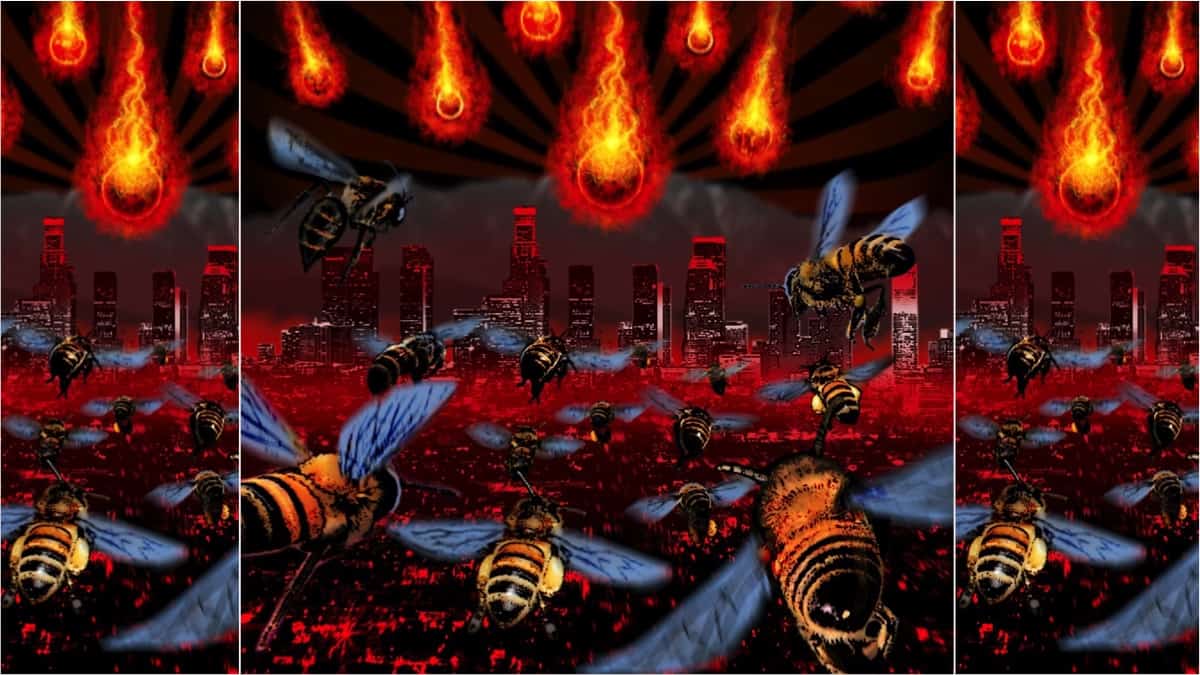
Killing Bees Racing Towards Ruin out May 10th via Tonequake Records.
There are some records where the first note grabs you and doesn’t let go. Before the first lyric is sung, Killing Bees pull you into Racing Towards Ruins via the sheer power of TONES, MAN, TONES. Brown-note bass reverberations and gut-punch kickdrum snap the listener out of daily reverie instantaneously. Together, bassist/vocalist Nic Nifoussi and drummer Ray Mehlbaum (both of Automatic 7) and producer Andrew Scheps (Mars Volta, Audioslave, Adele) have crafted a piece of art that fuses low-rock minimalism, post-hardcore aggression, and SoCal throttle rock urgency into, well, a real ass-kicker.
The bones of Killing Bees began their calcification when Nifoussi started a high school punk band called Automatic 7. They signed to BYO Records upon graduation and soon found themselves in need of a new drummer. Enter Ray Mehlbaum. Tours with Bad Religion, Social Distortion, Face 2 Face, Bouncing Souls, Suicide Machines, Unwritten Law, Youth Brigade, DOA, and others followed, as well as a deal with A&M Records. A&M got bought by Universal, the band moved to Vagrant Records, cut a new record, toured, then broke up.
“Eventually, Ray and I decided to start a two-piece band” explains Nifoussi. “I was trying out a new sound using 2 amps and an A-B switch. Overdrive through one amp and playing a lot of chords to get a guitar-like sound. After years of playing together, we were already tight and used to writing together. The songs came quickly and easily.”
Via Brett Gurewitz of Bad Religion, the band had come to know Grammy-winning producer and engineer Andrew Scheps. Though originally recommended as a producer for Automatic 7, when the band played him the Killing Bees songs, he loved the concept and the trio got to work on their self-titled debut. Following the record’s release on Guano Loco/Loose Fang Records, “we played a bunch of shows and eventually started writing the new record in our North Hollywood lockout” says Nifoussi.
Recorded once again at Scheps’ studio, drums and bass were recorded live, the only overdubs being vocals and some bass and accordion textures (Nifoussi is an accomplished accordionist). “We tracked the two together over 4 or 5 days and everything you hear was played live by talented humans, not put together after the fact. I think that live energy is what makes the record so compelling!” says Scheps. “Andrew wanted to challenge us. We came in wired towards traditional songwriting – he wasn’t interested in that” explains Mehlbaum. “He encouraged us to think about instrumental bits that would drive the tune, as opposed to the sing-along chorus of a traditional song. As a drummer, he kicked my ass. I remember him saying “we’re gonna turn the click off. I want you to go completely ‘out of time’ then come back in.” That’s some crazy shit! But I fucking loved it.”
Thematically, the record deals with the dangers of love and politics in equal measure. As Nifoussi puts it, “if there’s a takeaway, it’s to be careful with who you love… and vote into government.” So, Racing Towards Ruin. A concise, compelling listen, arresting at first blush, and deeply moving upon completion. A modern rock record (not a modern-rock record), unrelentingly heavy and sonically immaculate. And loud. Super loud.
Bass CDs
New Album: Lucy Clifford, Meeting Place
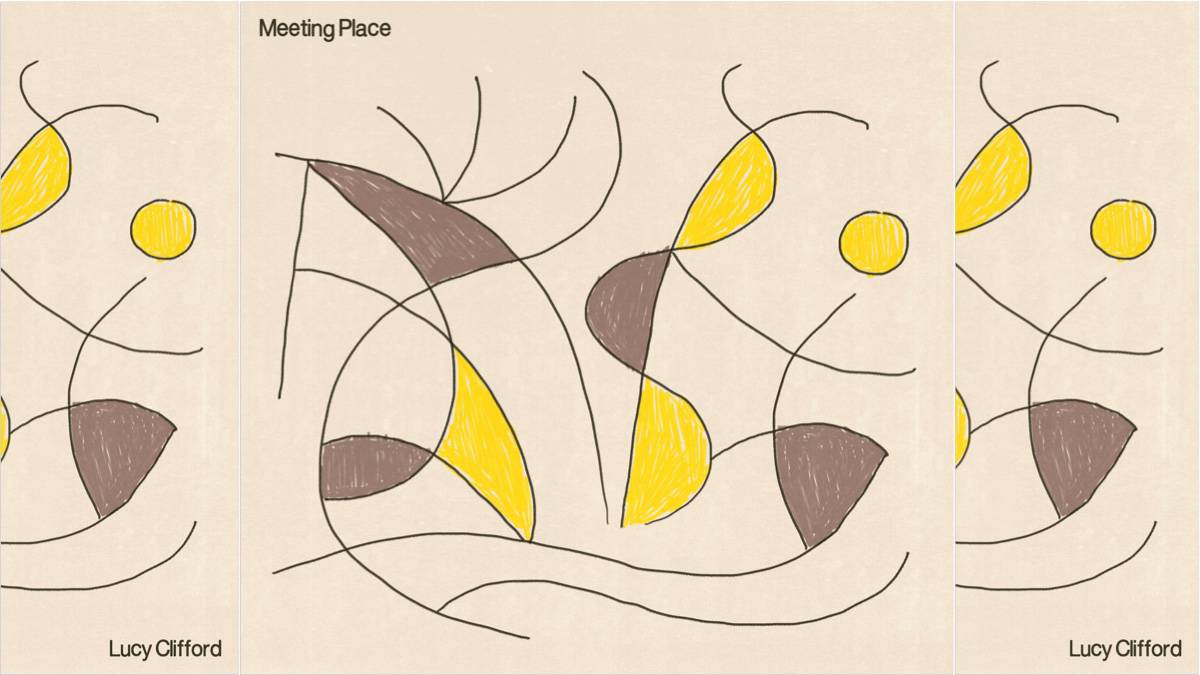
Bassist and composer Lucy Clifford has announced the release of her new EP ‘Meeting Place’.
This live studio recording was captured at Golden Retriever Studios in Sydney, and features Australian guitarist Felix Lalanne and Swiss drummer Jessie Cox.
As a bassist who has dedicated many years to accompanying artists of different kinds, Lucy shares some of her own music in a kaleidoscope of sounds and influences that have shaped her creative identity. The trio explores Lucy’s compositions, which weave between both energy and repose, lyrical soundscapes colliding with dynamic grooves that are sure to occupy your mind. This 4 song EP is presented as an uninterrupted musical odyssey and serves as a dedication to the places and people that hold a profound ability to anchor us in the present moment, our meeting places.
For Lucy, this meeting place created with Felix and Jessie is a “celebration of collaborative spirit and the immersive spatial movements of sound. In an era where connections are more crucial than ever, this music emerged while reflecting on the many borders, barriers, and structures that currently hold back human connection and communal bonds. We need reminding to rediscover our meeting places, that bring us the love, comfort, truth, and creativity we so urgently need.”
‘Meeting Place’ will be out April 5th on digital platforms, along with the live studio performance for viewing on Youtube.
Visit online at www.lucycliffordmusic.com

















